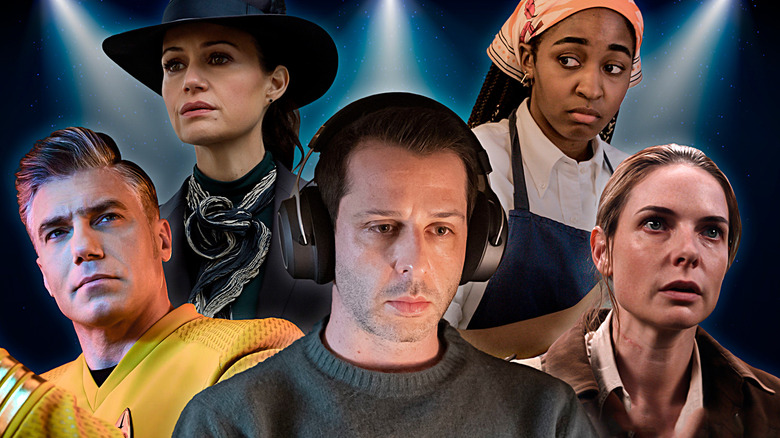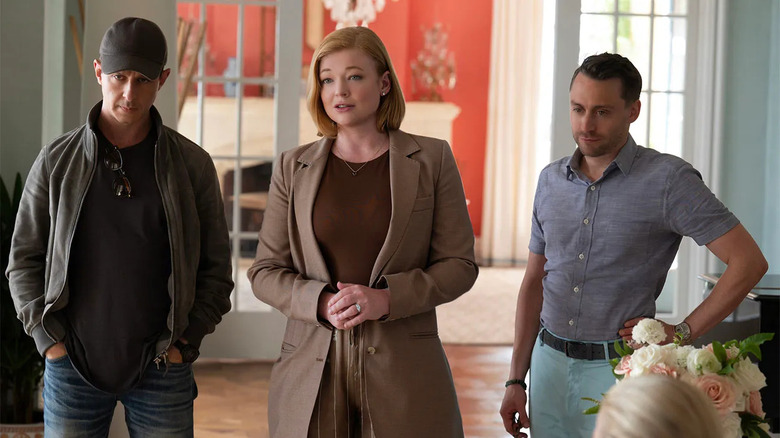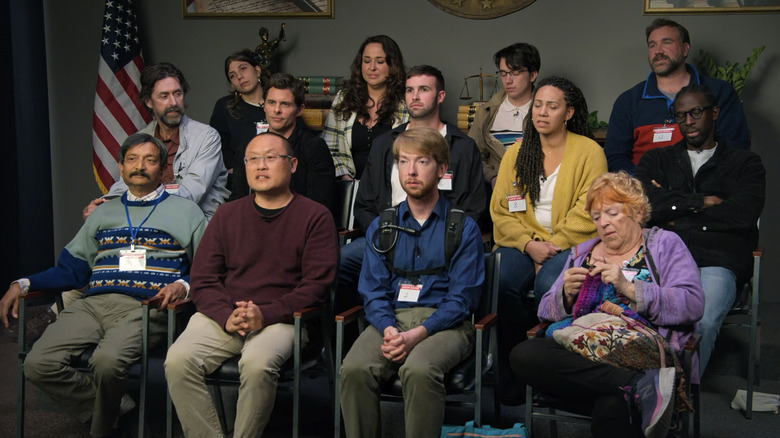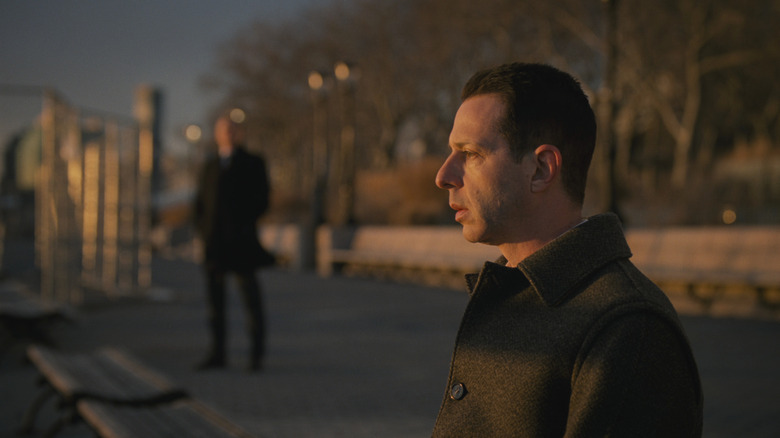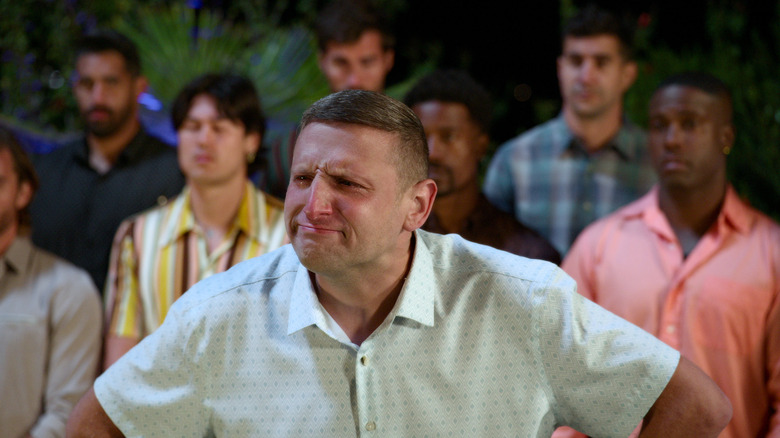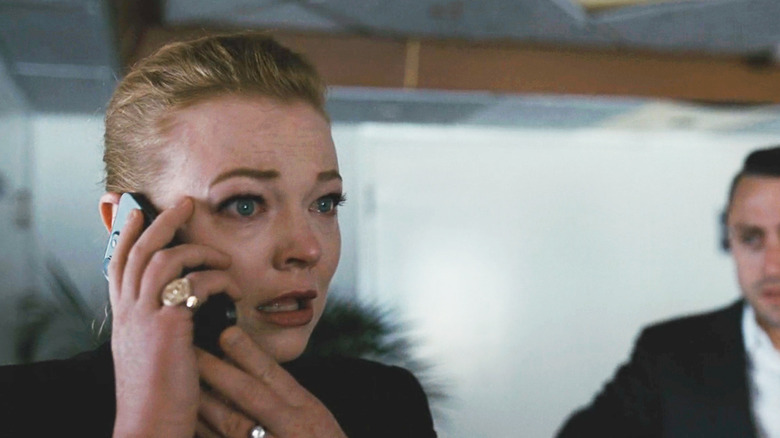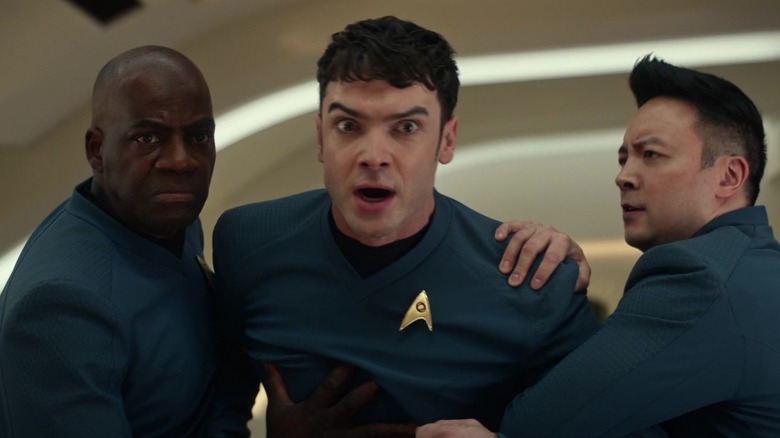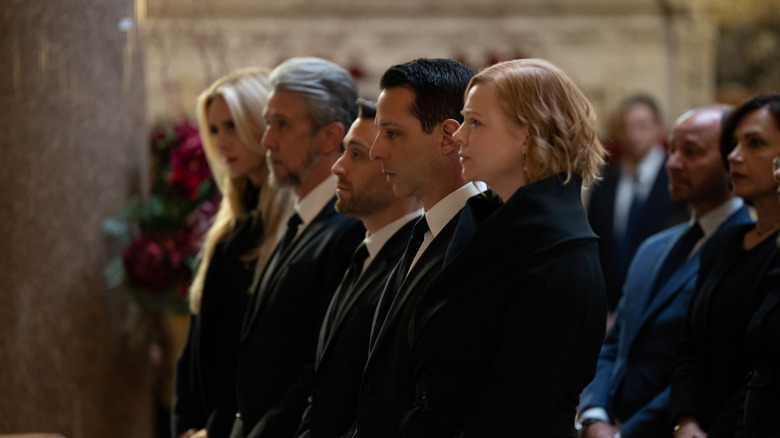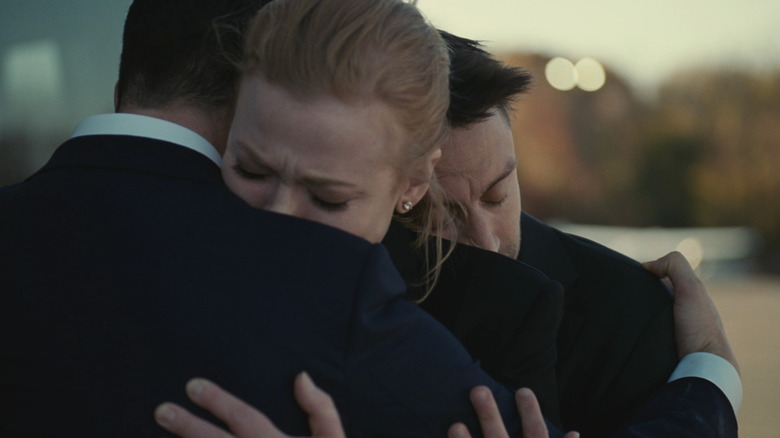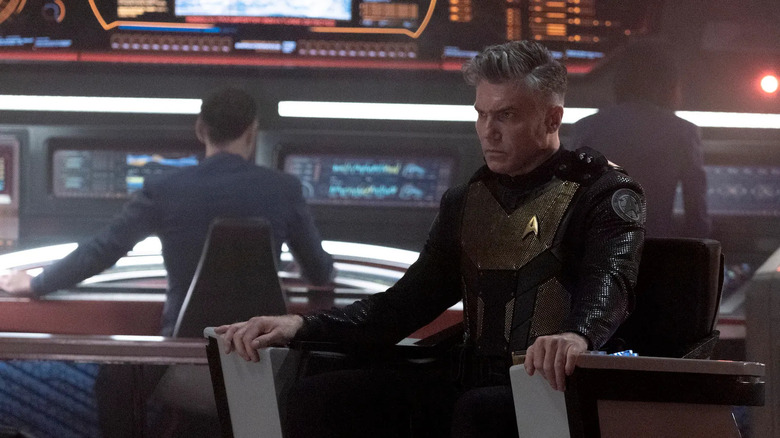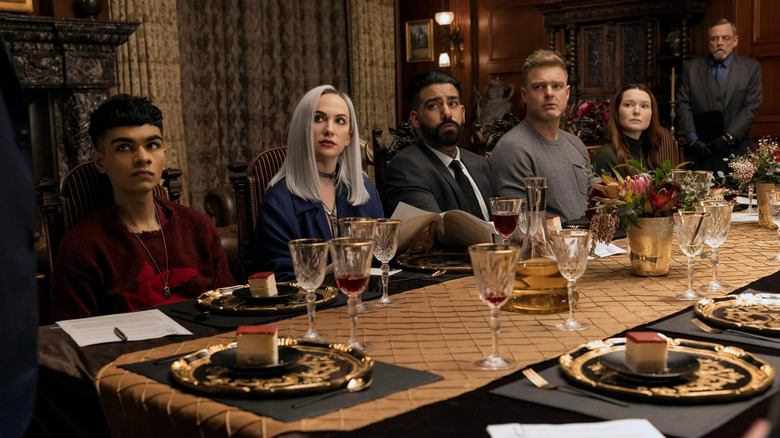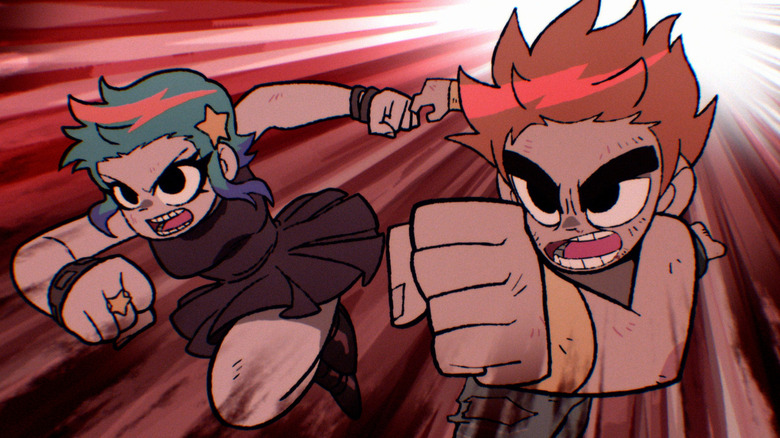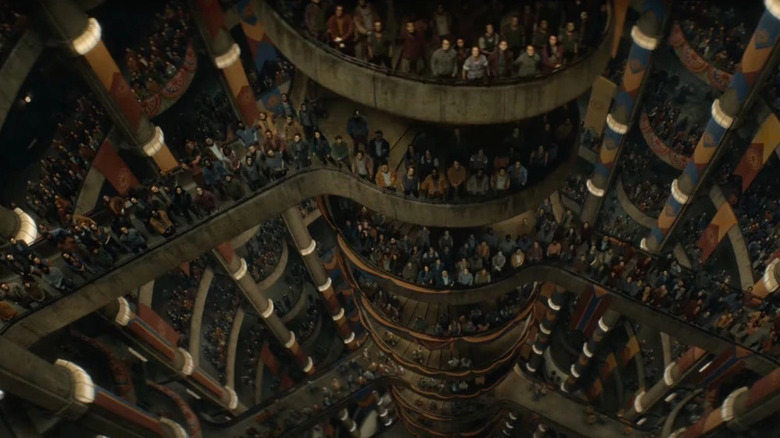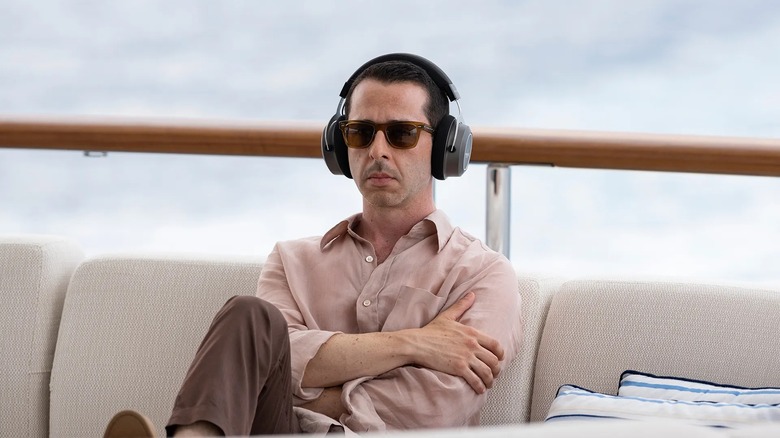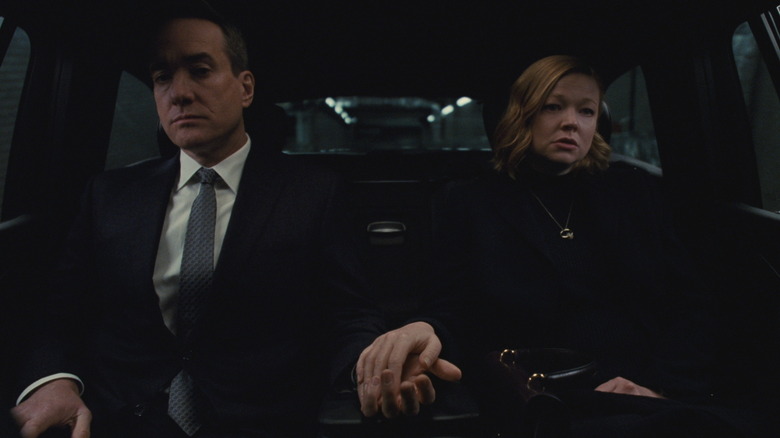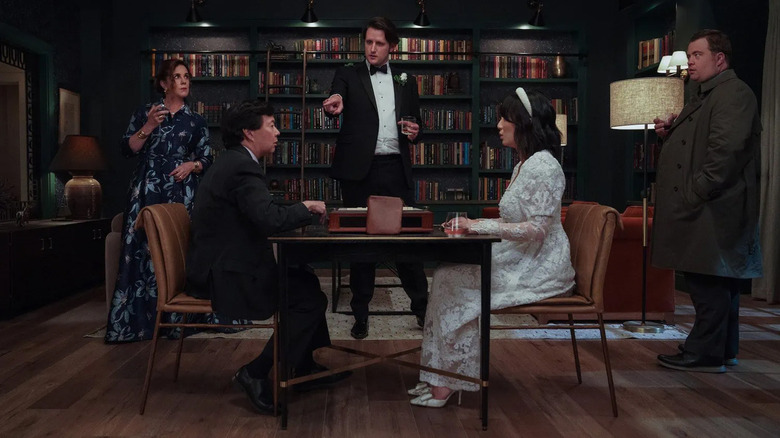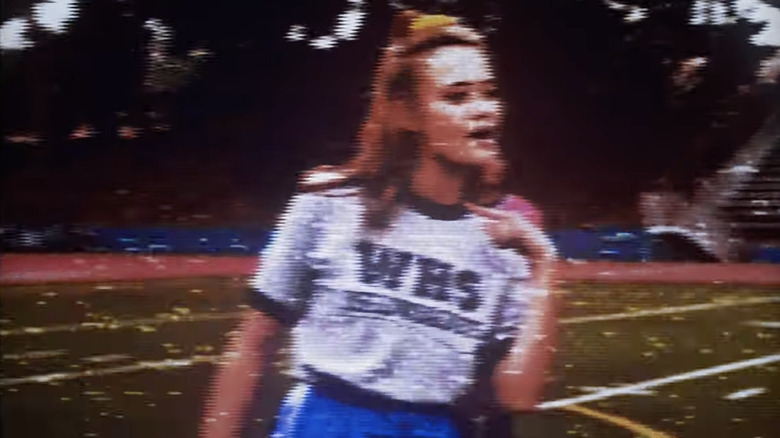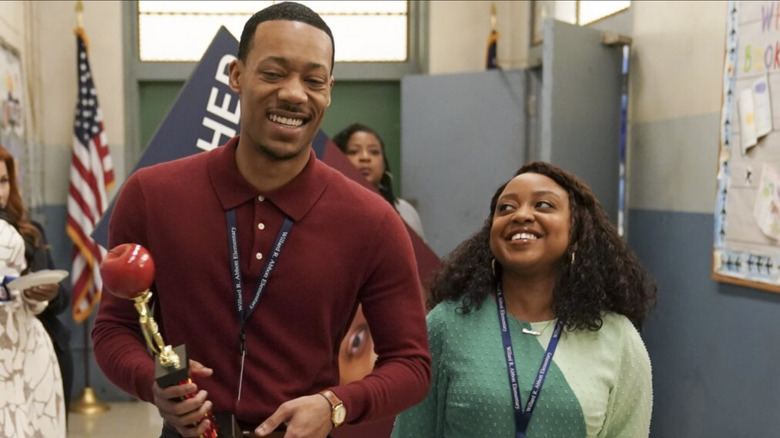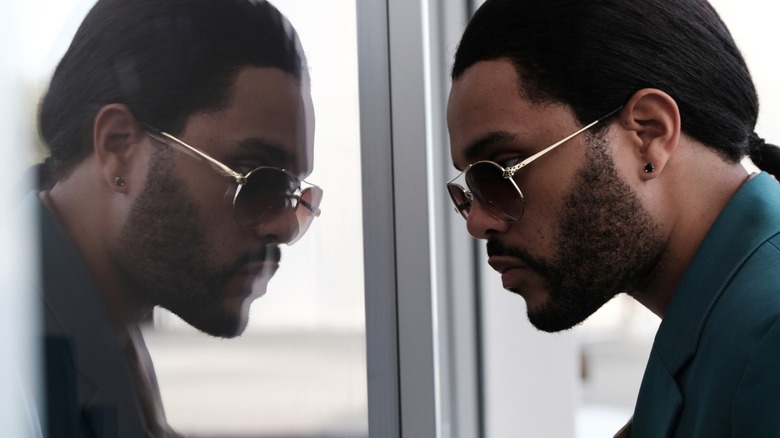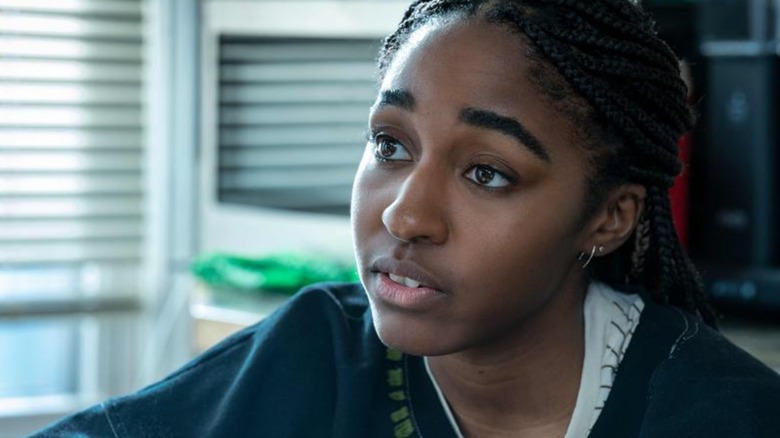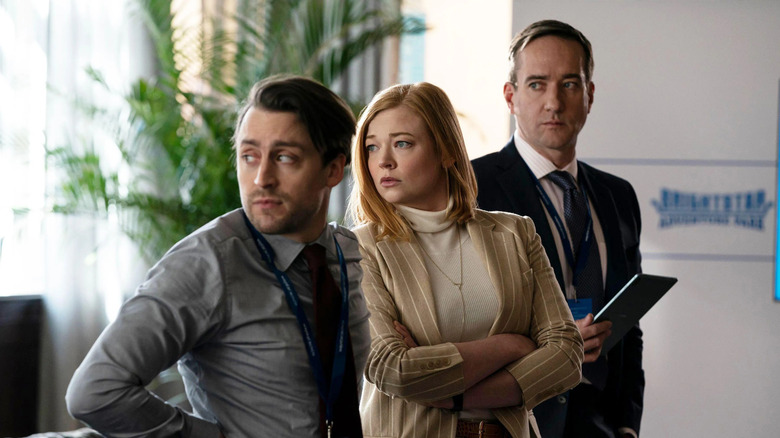The 2023 /Film TV Awards: The Best Shows, Performances, Characters, And More
Emmys? Light 'em on fire. Golden Globes? Trash heap. The first annual /Film TV Awards. There we go. That's the stuff.
Since there's too much television to watch these days, the writers and editors at /Film decided to hold our own little awards ceremony to pick the absolute best stuff you need to watch. Do you finally need one more push to check out "Succession"? Are you wondering which horror and science fiction shows need to be on your radar? Does your ongoing argument with your friend about the best performances in television from the past year need some extra juice? Don't worry. We've got you covered.
After a round of nominating, we determined five nominees per category. And after one final round of voting, we selected one final winner from the bunch. The result is a testament to just how great television was in 2023 ... and especially how much everyone at /Film really, really, really liked "Succession." Let's go.
Best Drama Series: Succession
By the time "Succession" aired its fourth and final season this spring, Jesse Armstrong's hilarious, cutthroat, tragic series about a dysfunctional, mega-wealthy family had already proven itself the best thing on TV several times over. How could "Succession" stick its landing after building up a distinctive world built on florid insults, jagged backstabs, and uncomfortably relatable unprocessed trauma? The show could've easily coasted into a good but predictable landing, but instead, Armstrong chose to implode the world he'd made like a collapsing supernova — and it was an awesome thing to witness.
No show from 2023 touches "Succession" because few shows, ever, have attempted the buried-the-leded writing method the series utilized so well. The climax of the series — an upsettingly familiar stolen Presidential election that unfolds across a single night like a slow-motion car crash — was seeded throughout its first four seasons in stray bits of dialogue and waved-away concerns, allowing it to sneak up on the ensemble in the most spectacular fashion. Also spectacular: the series' shocking death episode, which temporarily transcends its satirical boundaries to leave viewers emotionally wrecked. Frankly, saying goodbye to "Succession" also meant saying goodbye to some of the best writing and acting television has ever seen. (Valerie Ettenhofer)
Runners-Up: "The Bear," "Barry," "Beef" "The Last Of Us," "Beef"
Best Comedy Series: Jury Duty
Comedy is not monolithic. There are different approaches that work differently in a myriad of contexts, and there's no secret formula that guarantees people will laugh. But broadly speaking, one of the key aspects of a successful piece of comedy can often be the element of surprise. That was especially evident in this year's winner in this category, "Jury Duty."
The premise sounds a little cheesy: Under the guise of making a documentary, a camera crew films a group of jurors as they're selected for a court case, hear testimonies, and eventually deliberate on the verdict of someone's guilt or innocence. The twist: All of the participants are actors, except for one guy who has no clue he's in the middle of a reality show. Ronald Gladden, the protagonist at the center of the series, is an absolute miracle of a find, and this show would definitely not be as good without him. He's the everyman we all hope we would be in these circumstances: A kind-hearted, friendly, compassionate, thorough dude who just wants to do the right thing. The world needs more people like him.
And while "Jury Duty" is aspirational in that way, it also has a slight thriller component. Those actors surrounding Ronald the whole time (including James Marsden, playing a fantastic heightened version of himself) are doing "Curb Your Enthusiasm"-style improv comedy and staying in character for hours on end, and if they say something wrong or break in any way, the whole show could come crashing down around them. There's an edge-of-your-seat, will they be able to pull this off? quality here, and combined with the hilarious writing and ludicrous situations that take the whole premise riiiiight up to the line while somehow never crossing it, "Jury Duty" utilized that classic element of surprise to give us something we've never quite seen before. (Ben Pearson)
Runners-Up: "Abbott Elementary," "Only Murders in the Building," "Poker Face," "Reservation Dogs"
Best Dramatic Performance: Jeremy Strong, Succession
Jeremy Strong is very good at his job. Perhaps too good. So much has been said about Strong as an actor; specifically, the way he embraces the method, a style of acting vastly misunderstood by the general public (and even some actors). He doesn't like to rehearse. He instead prefers to immerse himself in the character; to "go through whatever the ordeal is that the character has to go through." Strong's devotion to his craft has even caused some of his costars to comment on, and even express concern over his raw intensity. "Succession" co-star Brian Cox said: "He's a pretty unique individual. But, he does get obsessed with the work. And I worry about what it does to him, because if you can't separate yourself — because you're dealing with all of this material every day. You can't live in it. Eventually, you get worn out."
Strong has racked up several notable performances over his career, but his biggest and most notable role to date has been playing the eldest boy himself, Kendall Roy, the sad, lonely, broken heir apparent to his father's media empire. Like all the Roys, Kendall is a terrible person, so you can't quite call him sympathetic. But Strong was able to squeeze empathy from the part; to make him relatable. We feel like we know this man, even if we don't want to actually know him. "The character is a bit of a litmus test," Strong said. "Some people use the word 'cringe,' and then others find him incredibly sympathetic. Do I think any of that's misunderstood? I don't know. There's something about this character, about this kind of boy-man — there is a lot of male vulnerability, which is something that always affected me growing up when I saw it in storytelling. In this moment in our culture, people either respond to that in a derisive way or in an empathic way. It's not my job to tell anyone how to respond to it, but there is something about vulnerability that is polarizing."
For the final season of "Succession," Kendall came closer to ever to realizing his dream of becoming the head of the company. His father dies. His siblings appear ready to back him. And then ... it all falls apart. He's left wandering, looking out at the river, completely lost. Part of the brilliance of the character, and the way that Strong plays him, is the sense that he gives that he doesn't really want the empire as much as he feels he deserves it. It should be his. And in the end, he can't have it. We should not weep for Kendall — he's still obscenely wealthy, after all. But we can pity him, and while part of that is due to how the character is written, it's also due to Strong's work, which is so powerful that I'm tempted to use the word "iconic." Thanks to Strong, Kendall Roy will go down in history as one of the all-time great TV characters. (Chris Evangelista)
Runners-Up: Ayo Edebiri, "The Bear"; Bella Ramsey, "The Last of Us"; Bill Hader, "Barry"; Steven Yeun, "Beef."
Best Comedic Performance: Tim Robinson, I think You Should Leave
Just when you thought it was safe to make eye contact with a stranger at a party, "I Think You Should Leave with Tim Robinson" returns for a third season to remind us that every social situation is a potential nightmare that might end in a furious fake water fight.
At the center of this whirling chaos is Tim Robinson himself, jumping from wild-eyed weirdo characters to the straight men confronted by their own wild-eyed weirdos. Robinson and co-writer Zach Kanin's comedy has a surreal, dreamlike quality anchored by nuggets of truth: the worry that talking about your kids too much might be making you boring at parties; the realization that you don't like your job very much; the fact that, for some people, true love is finding a zipline that lets you drop into a pool at the end.
Robinson's very strange delivery of his very strange lines carves itself on your brain. When his zipline antics get him kicked off "Summer Loving," he sticks his hands on his hips and honks like a disappointed goose. When he helps Jason Schwartzman with his talking-about-kids-too-much problem, he reveals a tragic backstory involving Godzilla the gorilla, pronouncing the last word "gorella." And when he says, "My life is nothing I thought it should be and everything I was worried it would become because for 50 seconds I thought there was monsters on the world," the matter-of-fact statement drifts into subtitle-necessitating quietness like a wisp of smoke on the breeze. (Hannah Shaw-Williams)
Runners-Up: Harrison Ford, "Shrinking"; Janelle James, "Abbott Elementary"; Natasha Lyonne, "Poker Face"; Quinta Brunson, "Abbott Elementary"
Best Dramatic Episode: Succession, 'Connor's Wedding'
Going into the third episode of "Succession" season 4, we were expecting some unprecedented disaster to befall the Roy family. The show always reveled in destroying celebratory occasions in spectacular fashion, and Connor Roy's wedding was surely going to be no different. But I don't think any of us were prepared for just how cataclysmic a disaster we were about to witness with the death of Logan Roy.
Making matters worse is the fact that we never really witnessed said disaster. After three full seasons of Logan's toxic influence essentially dictating his children's every move, the patriarch of the family abruptly dies off-screen, save for an unsettling shot of him receiving CPR. This monolithic figure, both revered and feared for his savage business sense and machiavellian brilliance, ultimately expires in unceremonious silence.
The fallout, however, was anything but silent. As the Roy kids grapple with the weight of the situation, intense emotions surfaced in a scene that will surely remain one of the most memorable in TV history. The performances from the cast — especially Sarah Snook — are simply outstanding, lending the whole thing a real sense of authenticity. Yet, even with the despair uncomfortably palpable, there is still something darkly funny about this happening while everyone was there for a huge celebration. In that way, the episode feels uniquely calamitous and emotionally stirring, yet totally in keeping with the show's overall tone. (Joe Roberts)
Runners-Up: "Barry," 'WOW,' "The Last of Us," 'Long, Long Time,' "The Bear," 'Fishes,' "Silo," 'Freedom Day'
Best Comedic Episode: Star Trek: Strange New Worlds, 'Charades'
Comedy has always been as intrinsic to "Star Trek" as phasers, shields, and social metaphors. In only two seasons, "Strange New Worlds" has found the perfect balance between humor and pathos, all while telling richly-developed stories across the entire emotional spectrum. Look no further than the tense season finale cliffhanger "Hegemony" existing side-by-side with the most lighthearted adventures, like when the crew of the USS Enterprise broke out into constant song or crossed paths with the bumbling heroes of the animated series "Lower Decks." None, however, rival /Film's pick for the best comedic episode of the year.
"Strange New Worlds" has mined plenty of drama from the relationship between the half human/Vulcan Spock (Ethan Peck) and his betrothed T'Pring (Gia Sandhu), though never quite like the antics in the season 2 episode "Charades." It's a classic premise ripped straight out of countless sitcoms and rom-coms alike: the disapproving in-laws are visiting for an important cultural ritual, and they'd better be impressed. The timing couldn't be worse for poor Spock, however, as an encounter with a space anomaly has left him inexplicably changed — now fully human, both inside and out. Freed of his emotional self-constraints, Spock devours human cooking with glee, petulantly picks fights with messy officers who don't clean up after themselves, and generally acts like a hormonal teenager before attempting to fool his in-laws without giving away the game.
Packed with heart, comedy, and some serious sexual tension, it's perfect "Trek" and the funniest TV episode of 2023. (Jeremy Mathai)
Runners-Up: "Jury Duty," 'The Verdict,' "Party Down," 'KSGY-95 Prizewinner's Luau,' "Reservation Dogs," 'Send It,' "The Righteous Gemstones," 'Wonders That Cannot be Fathomed, Miracles That Cannot Be Counted'
Best Ensemble: Succession
Too often films and television shows praised for their "great ensemble casts" are merely praised for casting a lot of already famous people in major roles. But the best ensemble pieces — stories truly driven in equal measure by each of their principal players — are those which make stars out of the actors they cast. This was the case with "Succession." Casting director Avy Kaufman pulled together a murderer's row of powerhouse talents that had, before 2018, largely missed stardom, plum roles like these having eluded them throughout their careers.
Brian Cox, Matthew Macfadyen, and Kieran Culkin were likely familiar to many viewers upon the show's premiere, but they form only a segment of "Sucession's" brilliant ensemble. Where would film and TV culture be now without Sarah Snook, Jeremy Strong, J. Smith Cameron, Nicholas Braun, or Hiam Abbass? Series creator Jesse Armstrong and his writing team succeeded in making "Succession" one of the most successful ensemble dramas in television history by leaving no stone unturned, which translates in episodic writing terms to not saying goodbye to any character before they've had the chance to seize complete attention and single-handedly shove the series' primary narrative forward. Think of the way Tom Morley's waiter, Doddy, while only appearing in a single episode, continued to haunt Strong's Kendall throughout four seasons. That's smart, incisive, unforgettable ensemble writing. (Ryan Coleman)
Runners-Up: "Star Trek: Strange New Worlds," "The Bear," "The Fall of the House of Usher," "The Righteous Gemstones."
Most Intense Moment or Sequence: Succession, Logan is Dead ('Connor's Wedding')
For a show premised on the eventuality of one particular character dying, it's shocking just how shocking Logan's death was to behold in "Succession" season 4, episode 3. The show is literally called "Succession;" for three full seasons, everything had hinged on what will happen after Brian Cox's media magnate and Roy family patriarch dies. And yet, when it happens suddenly, right after a nasty voicemail from his youngest son, right after he'd given that son some of the most treacherous marching orders in a career built on them, everyone is left blindsided, speechless, and unable to even conceive of what happens next.
It's bold to kill off a main character in your final season. It's even bolder to kill off a character as consequential and all-encompassing as Logan not in the season premiere or finale, but in episode three, almost in the background, casually. There's grief, there's crying (some of Sarah Snook's best work in the entire series right there), but very quickly, there's just texts, emails, and business calls. The mighty man is reduced within hours to what he really meant to people — stock prices and promotions. "Connor's Wedding" was helmed by the series' A-Team, being written by series creator Jesse Armstrong and directed by its best lenser, Mark Mylod. Its tragedy is of biblical scale, its comedy dark and unsparing. The final image of Kendall (Jeremy Strong) watching the body of his greatest hero and villain being carted away is unforgettable. (Ryan Coleman)
Runners-Up: "The Bear," Dinner Gets Out of Control ('Fishes'), "The Fall of the House of Usher," The Monkey Attack ('Monkey's Paw'), "Barry," The Home Invasion ('The Wizard'), "The Last of Us," Joel in the Hospital ('Look For the Light').
Best Sci-Fi Show: Star Trek: Strange New Worlds
There's no need to beat around the bush here: "Star Trek: Strange New Worlds" is the best "Star Trek" in 30 years, finally bringing the franchise back to the highs of its '90s heyday. Few 2023 shows were as comforting, as clever, as creative, as fun, and as touching as the second season of "Strange New Worlds," which managed to do the impossible and deliver every conceivable flavor of "Star Trek" across its all-too-brisk 10 episodes. Each week, "Strange New Worlds" delivered surprise after surprise, refusing to sit in one gear. Action-packed war episodes were followed by philosophical hard sci-fi, pitch-black ethical fables mixed with swoon-worthy time travel romance, and only this show would set up its grim, terrifying cliffhanger finale with a full-blown musical episode.
While "Star Wars" television often struggles to find an ideal balance between throwback nostalgia and charting a brave new course, "Star Trek" seems to have found its groove after a few too many years in the wilderness. "Strange New Worlds" isn't just excellent "Star Trek" — it's some of the best "Star Trek" ever made. And that puts it in the conversation for some of the best science fiction ever made. It's a bottomless well of infinite pleasures, accessible to newbies and old-timers alike. This is a perfect television program. (Jacob Hall)
Runners-Up: "For All Mankind," "Gen V," "Mrs. Davis," "Silo"
Best Horror Show: The Fall of the House of Usher
When Roger Corman was pitching his idea of making a big screen version of "House of Usher" for American International Pictures in 1960, he apocryphally told the producers that there was no physical monster because "the house is the monster." Corman's application of Freudian dream theory to Edgar Allan Poe's works was a big step forward in keeping the core elements of the writer's work (along with, subsequently, numerous other classic genre authors) intact while reintroducing them to a modern audience.
With Netflix's "The Fall of the House of Usher," director Mike Flanagan, his co-writers and co-director Michael Fimognari continue the tradition of remixing and remastering Poe for a new era, making it feel fresh and surprising to fans of the author both new and old in a way that recalls the best years of the Marvel Cinematic Universe (it feels a little odd but most welcome to cheer the appearance of a pendulum, for instance).
Yes, in portraying the tale of doomed Roderick Usher and his family as a corporate dynasty of wealthy, backstabbing, arrogant fools, the show deliberately feels like a horror version of "Succession." Yet that show could've used some more horrific deaths in it, anyway, and Flanagan doesn't skimp on the grisliness, bringing his penchant for well-placed jump scares and violence along with his love of lengthy monologues.
"The Fall of the House of Usher" is, full stop, a well-rounded horror show, featuring a narrative that's modern yet classical, a stellar ensemble cast, laughs, scares, and pathos. Above all, in this "Usher," it's clear that the people with rotted souls are the true monsters. (Bill Bria)
Runners-Up: "The Changeling," "Goosebumps," "The Last of Us," "Yellowjackets"
Best Animated Show: Scott Pilgrim Takes Off
"Scott Pilgrim Takes Off" is a miracle of a TV show. This is a show made by a Japanese anime studio, with an American showrunner, with a story so intrinsically connected to Toronto, and based on a beloved comic by a Canadian author that already got a perfect movie adaptation. And yet, it manages to surpass expectations by not following any rule, but instead rebuilding the original "Scott Pilgrim" text into something new that interrogates itself while reinventing and remixing itself. This is a meta reboot that could only work with 20 years worth of context and hindsight, much in the way "Twin Peaks: The Return" and the "Rebuild of Evangelion" movies work. Side characters become protagonists. Villains get a chance to take a different path and truly find themselves. Scott Pilgrim may be in the title, but this is truly Ramona's show.
While having the cast of Edgar Wright's movie return to their roles helps connect this to the previous adaptation of the comic, "Scott Pilgrim Takes Off" shines because of how the series adapts and reinvents the source material. This is one of the most visually stunning anime of the year, if not outright one of the best-looking TV shows, period. A fantastic mix of Japanese and Western aesthetics, with popping bright colors, reality-shifting action and plenty of great humor — this is a masterclass in adapting a popular work for a new medium. (Rafael Motamayor)
Runners-Up: "Blue Eye Samurai," "Bluey, "Hilda," "Vinland Saga"
Best Show You're Not Watching: Silo
Doing a mystery show box in the years since "Lost" truly feels like a lost cause. Only a handful of TV shows have understood the unique mix of intrigue, character, mythology and drama that made "Lost" successful. Luckily, "Silo" understands what "Lost" knew. From the start of the first episode, audiences are thrown into a fascinating, lived-in world full of history, secrets, and an intriguing sci-fi mythology. And yet, it is the human drama at its core that makes "Silo" a successful show. Sure, knowing how the world (supposedly) ended and humanity was forced to live in a sprawling underground bunker makes this a thrilling watch. But it is Rebecca Ferguson's quest to investigate the mysterious alleged suicide of her lover, and the larger cast of characters trapped in this caste system, that makes this one of the most underrated shows of the year.
"Silo" features incredible visual storytelling, showing us how the Silo works and how every aspect of this world and culture is shaped by the environment surrounding these people. There are hints of Bong Joon-ho's adaptation of "Snowpiercer," in the way both build up a detailed world within a confined space, and of the way "Blade Runner" sprinkles hints of a massive world through a noir mystery. By the time "Silo" finally starts unraveling its mystery and showing us what is really going on, there is no escaping this story. You're hooked. (Rafael Motamayor)
Runners-Up: "Platonic," "Shrinking," "Slow Horses"
Best Messy Character We Have Complicated Feelings About: Kendall Roy, Succession
"Succession" lead Kendall Roy (Jeremy Strong), the internet's favorite problematic man-child, is one of the show's many highlights for a reason. Kendall is as morally corrupt as it gets, the heir-apparent of a dynasty he's worked towards all his life at the expense of everything he should have held dear. His overpowering façade of confidence is just that: a fragile front, bolstered by the affluent entitlement he's taken for granted, which comes crumbling down in a deliciously gradual, staggering display of self-ruin. Desperate to become as emotionally ruthless as his father, he simultaneously harbors barely contained disdain and overwhelming affection for the man who doomed his children.
The sheer drama of whether the name "Kendall Logan Roy" has been underlined or crossed out in his father's will encapsulates the character's innate appeal, where his journey is like a predestined train wreck you cannot look away from. Then there's the ironic sense of relatability in the form of his desperate attempts to act cool, with the Gucci sneakers of it all, while brandishing zero self-awareness when he tries to seem more put-together than he can ever be. He's repulsive yet vulnerable at the same time, propping up an ego that is as inflated as it is bruised across the four astoundingly enjoyable seasons of the show. (Debopriyaa Dutta)
Runners-Up: Joel, "The Last of Us", Richie, "The Bear", Roman Roy, "Succession", Sally Reed, "Barry"
Most Shattering Finale: Succession, 'With Open Eyes'
For a moment it looked like they had it.
The Roy siblings — Kendall (Jeremy Strong), Roman (Kieran Culkin), and Shiv (Sarah Snook) — spent "Succession" climbing over each other to seize their father Logan's (Brian Cox) throne at the head of Waystar Royco. Season 4 cleared Logan off the deck early to show how his children exist in a world without him. In "With Open Eyes," they proved him right that they're not serious people. Kendall briefly rallies his siblings to make himself CEO, but by the time of the roll call, Shiv starts asking what her brother has done for her lately and gets Roman uncowed in the process. With Kendall unable to give a single good reason why he should be CEO, he talks himself out of the job and the siblings get physical like squabbling children.
There are plenty of lingering threads by the end of "With Open Eyes," but not for the Roys. They have money-rich lives ahead of them, yet the essential chapters of their stories are over. They'll never get the approval of their father or match him by wearing his crown. To echo creator Jesse Armstrong, their own show has lost interest in them. "Succession" knew exactly where it wanted to end and such confidence demands admiration. (Devin Meenan)
Runners-Up: Barry, "WOW;" The Last of Us, "Look for the Light;" Loki, "Glorious Purpose;" Star Trek: Strange New Worlds, "Hegemony"
Best Show That Was Canceled Too Soon: The Afterparty
Over the past few years, murder mysteries have become all the rage again. Partially fueled by true crime documentaries and podcasts, as well as the success of movies like Rian Johnson's "Knives Out" and Kenneth Branagh's new take on Agatha Christie's "Murder on the Orient Express" (and their ongoing sequels), audiences have been thirsty to solve the ultimate puzzle of sudden death at the hands of an unknown villain. Sadly, that craze wasn't enough to stop the death of the murder mystery comedy series "The Afterparty" on Apple TV+.
Created by Chris Miller, who also executive produced with his frequent collaborator Phil Lord, the anthology crime series follows Tiffany Haddish as a private eye solving a mysterious murder among an incredible ensemble cast of comedic talent. Across the show's two seasons, Sam Richardson and Zoë Chao stayed involved in both cases while hilarious names like Ike Barinholtz, Ben Schwartz, Ilana Glazer, Jamie Demetriou, Dave Franco, John Cho, Paul Walter Hauser, Ken Jeong, and more starred in a single season, each bringing a colorful character to the table.
But where "The Afterparty" really stood out was in how each suspect's story played out, using a variety of film and TV genres to frame each of their perspectives leading up to the murder. High school drama, twisted animation, film noir, musicals, 1980s soap operas, campy horror, the filmography of Wes Anderson, and much more inspired different episodes, unfurling the overall murder mystery in a stylish and entertaining fashion that always brought something fresh to the familiar genre. With endless possibilities for future murder mysteries, it's an absolute shame that Apple TV+ decided to pull the plug after just two seasons. (Ethan Anderton)
Runners-Up: "The Great" "A League of Their Own," "Reboot," "Shadow and Bone"
Best Opening Title Sequence: Yellowjackets
"Yellowjackets" has an astounding soundtrack — especially if you're a '90s fan. This year's second season was advertised with a delirious cover of "Just A Girl" by Florence Welch, and the episodes' discography ranged from "Something in the Way" to "Bullet with Butterfly Wings."
Still, no song is more synonymous with the show than its opening: "No Return" by Craig Wedren and Anna Waronker. In 2023, it was once again the creepiest theme song on television. The song begins with some simple, punk-flavored three-line verses ("It was cool, Nothing fire, Nothing broke"), but in the last 20 seconds, devolves into an angry chant of "No Return," as if warning and taunting our leads of their doom.
The title sequence is presented as grainy video footage on an outdated TV, suggesting hazy memories of a bygone era. Like the show itself, the titles bounce between the girls stranded in the wilderness and them back in civilization (a visual motif of their faces blurring reflects the masks they wear), but it never stops being unnerving. From inserts of animals (including, of course, a Yellowjacket hive) to half-visible shots of cultish horrors, "No Return" dares the viewer to try and piece it together.
Compared to season 1, season 2's "No Return" is largely the same, reusing the song recording (excepting the Alanis Morissette cover in episode 7) and inserting only a handful of new footage. You don't fix what isn't broken. (Devin Meenan)
Runners-Up: "Good Omens," "Only Murders in the Building," "Succession," "Vinland Saga"
Best Couple (Real or Imagined): Janine and Gregory, Abbott Elementary
As the kids say, it feels like we have lost the recipe when it comes to writing will-they/won't-they relationships on television. Maybe it's because writers are terrified execs are going to cancel their series before storylines can play out or because execs are terrified that audiences won't have the patience for a relationship arc to grow — it's not as common for a TV series to tease a coupling of main characters. But luckily, Quinta Brunson exists, and she has given us our best TV couple in years.
Janine (Brunson) and Gregory (Tyler James Williams) are both teachers at the titular "Abbott Elementary" and are so clearly meant to be together. Alas, because of complications like being coworkers, being in relationships with other people, and garden variety insecurities, they're still waffling between finally admitting that they're soulmates and randomly kissing during professional development conferences. Season 2 saw the duo finally admit that they have romantic feelings for one another, only to decide that a relationship isn't right for them ... right now. Did viewers across the country scream at their TV? Yes, and I was one of them. Do I know that Quinta knows what she's doing and would not hurt us? *siiiigh* Also yes.
When all is said and done, Gregory and Janine will go down in history as the best sitcom couple of the 2020s, and the line "I take all of your recommendations seriously. I want to know why you like stuff," will overtake Jim Halpert's "Plan A was marrying her a long time ago, pretty much the day I met her" from "The Office" as the peak of TV romance. (BJ Colangelo)
Runners-Up: Aziraphale and Crowley in "Good Omens," Bill and Frank in "The Last of Us," Stede and Ed in "Our Flag Means Death," Kelvin and Keefe in "The Righteous Gemstones."
The Best Bad Show We Watched Anyway: The Idol
Ahead of its premiere, it was already clear that "The Idol" would be a pop culture inflection point for a generation of viewers who are more in tune with the ethics of their media consumption than ever. There were good reasons not to watch the show, like a Rolling Stone report about allegedly gross working conditions and the questionable departure of well-regarded filmmaker Amy Seimetz. There were also reasons to give the show a shot. Depiction doesn't equal endorsement, after all, and early backlash about the show seemed to be more focused on audiences feeling icked out by the fictional sexual dynamics on display than by any real-life misbehavior. Also, as pop culture critics, some of us just had to watch "The Idol" for work.
Regardless, once "The Idol" actually dropped, it was clear that naysayers were right to avoid the whole mess entirely. While hints of a better show bled through (the visuals are striking and Lily-Rose Depp and the supporting cast are great), "The Idol" turned out to be a muddled, nasty piece of work that by its final episodes dropped any pretense of purpose beyond shock value. The show had many flaws, but its worst may have been its complete inability to do anything meaningful with its most-hyped character, culty wannabe dom Tedros (The Weeknd). After an awkwardly short first season, the show got canceled — an anticlimactic ending that's a perfect fit for the milquetoast bad boy at its center. (Valerie Ettenhofer)
/Film's First Annual TV Person of the Year Award: Ayo Edebiri
In discussions of Ayo Edebiri's banner year, focus often tilts towards the actor's breakout film roles in "Theater Camp," "Bottoms," and more. Yet Edebiri's success — which didn't start with the pressure cooker restaurant dramedy "The Bear" but was certainly magnified by it — as a TV actor is just as prolific. In addition to her turn on "The Bear," where she plays one-half of the most angsty and beloved culinary partnership of the decade, Edebiri appeared this year in breakout sitcom "Abbott Elementary," cult comedy favorite "I Think You Should Leave With Tim Robinson," Phil Lord and Christopher Miller's "Clone High" reboot, Mel Brooks' "History of the World, Part II," and three additional animated shows.
/Film's Person of the Year Award isn't a trophy for breadth of roles, though Edebiri's ability to seemingly be in multiple places at once is impressive. No, the actor has earned this distinction with her rare talent and endless watchability. She brings a sense of unpredictable, playful humor to every project she does, and counters it with remarkable depth and earnestness in dramatic scenes. There are few TV moments this year that feel more rewarding than watching Sydney masterfully take over front-of-house when Carmy gets trapped in a walk-in freezer, killing her doubts once and for all with a show of confidence she's earned over the past two seasons. Likewise, few sister relationships on TV are introduced with the sense of fully-formed, complex realism that Edebiri and Quinta Brunson effortlessly pulled off in her "Abbott Elementary" debut.
Edebiri makes everything she's in significantly better. This year, with eight different great TV roles, it's safe to say she made the entire medium better. (Valerie Ettenhofer)
How this list was made
This list was crafted by asking the /Film editorial and writing teams to submit up to three nominees per category, which were tabulated into a master list (discussion and debate of the public and private varieties prior to submission were encouraged). A master list of nominees was crafted, and from there, the most nominated titles and individuals made it to the next round of five nominees. From there, the full nomination list was made available to the /Film team for final voting. Any ties were broken by /Film editorial via debate. We feel this final article reflects the tastes of the site as whole, and the many people who work every day to make it great.
